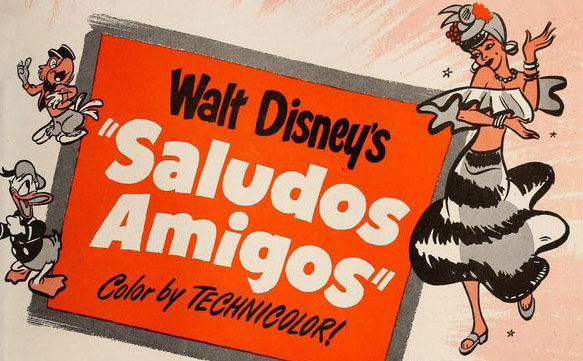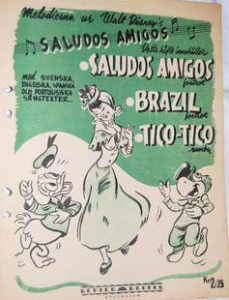
As all Disney-fans know, another song was interpolated into the “Aquarela do Brasil” number in Saludos Amigos. That song was known in Brazil as “Tico-Tico No Fuba”.
The song had been written as an instrumental composition–a “choro”–as early a 1917. Portuguese lyrics were added in 1931. The same year, the earliest-known recording of the piece–still played as an instrumental choro–was made for the Columbia label by a group called Orquestra Colbaz.
It is quite obvious that Disney heard the piece. It is a matter for specualtion whether he took back with him a recording of the Colbaz version.
But it is interesting to note that, on the actual soundtrack of the cartoon, we don’t hear Charles Wolcottt’s more lush orchestration, which he would record for Decca two years later. Instead, we have a chart that follows the Colbaz arrangement, adding such Brazilian percussion instruments as the pandeiro (a tambourine) and the chocalho (maracas, more or less). Flute, accordion, and bandulim (a mandolin) follow each other in taking the melody, with visual gags built around the flute and accordion leads.
Disney may not have owned the copyright on “Tico-Tico” (as we North Americans called it)–even though Charles Wolcott (as mentioned above) featured it in Decca’s album of pieces from “Saludos Amigos”.
In early 1944, the song was a feature of Bathing Beauty, an M-G-M Technicolor romp that featured Esther Williams–who proved to be quite the draw at the box-office. Here, it was featured by Ethel Smith, a pert and fleet stylist on the Hammond electric organ.
 From there, the song took off. An English-language lyric was written–every bit as much the tongue-twister as its Portuguese counterpart. And, whereas the Portuguese lyric was a warning that a small native swallow had gotten into the cornmeal again, the English lyric was a more simple love song.
From there, the song took off. An English-language lyric was written–every bit as much the tongue-twister as its Portuguese counterpart. And, whereas the Portuguese lyric was a warning that a small native swallow had gotten into the cornmeal again, the English lyric was a more simple love song.
Later in the Forties, Yiddish-flavored comedian/clarinetist Mickey Katz found the little bird a good subject for a parody. Accompanied by his Kosher-Jammers (a takeoff on Jerry Jerome’s Cats ‘n’ Jammers, which was itself a takeoff on a well-known comic strip about a couple of mischievous German-American children, Mickey recorded “Tickle-Tickle” for RCA Victor.
That disc was a hit wih the Jewish audiences at which it was aimed–and may have gotten some sales and/or airplay outside of the Yiddish-speaking community. It certainly didn’t hurt the career of Mickey Katz.
Of course, Carmen Miranda had to add the song to her repertoire. She also recorded it for the Decca.
And, as we shall see, Disney added some more Brazilian songs to his next project: The Three Caballeros.


 James Parten has overcome a congenital visual disability to be acknowledged as an expert on the early history of recorded sound. He has a Broadcasting Certificate (Radio Option) from Los Angeles Valley College, class of 1999. He has also been a fan of animated cartoons since childhood.
James Parten has overcome a congenital visual disability to be acknowledged as an expert on the early history of recorded sound. He has a Broadcasting Certificate (Radio Option) from Los Angeles Valley College, class of 1999. He has also been a fan of animated cartoons since childhood.












































“Tico-Tico” had a busy few years in Hollywood. Aside from SALUDOS AMIGOS and BATHING BEAUTY, the song was also heard in 1943’s THOUSANDS CHEER (MGM), where Maxine Barrat and Don Loper danced to it, in 1944’s KANSAS CITY KITTY (Columbia), where it was sung by Jane Frazee, in 1945’s IT’S A PLEASURE (RKO), where Sonja Henie ice-skated to it, and in 1947’s COPACABANA (United Artists), where Carmen Miranda sang it.
Ethel Smith, who as mentioned above, played “Tico-Tico” in BATHING BEAUTY, also recorded it, her performance appearing on Decca 23353. Other recordings of the song in the 1944-45 period were made by the Andrews Sisters (Decca 18606) and by Xavier Cugat and His Waldorf-Astoria Orchestra (Columbia 36780).
“Tico-Tico” turned out to be a real moneymaker for Decca. The recordings by Charles Wolcott and His Orchestra and by the Andrews Sisters both made the Billboard charts in August 1944, Wolcott’s version peaking at #13 and the Andrews Sisters’ at #18. Ethel Smith’s record made a brief chart appearance in January 1945.
Miranda also sang “Tico-Tico” in an “Army-Navy Screen Screen Magazine”.
“Tico-Tco” was also featured in Woody Allen’s “Radio Days”.
And, of course, Ethel Smith would go on to appear in the “Blame It On The Samba” segment of Melody Time.
In the 1970’s a Tio Pepe wine commercial used a parody of “Tico Tico.”
I first heard the title mentioned on an Andy Griffith episode
NOBODY played “Tico” like Ethel Smith !